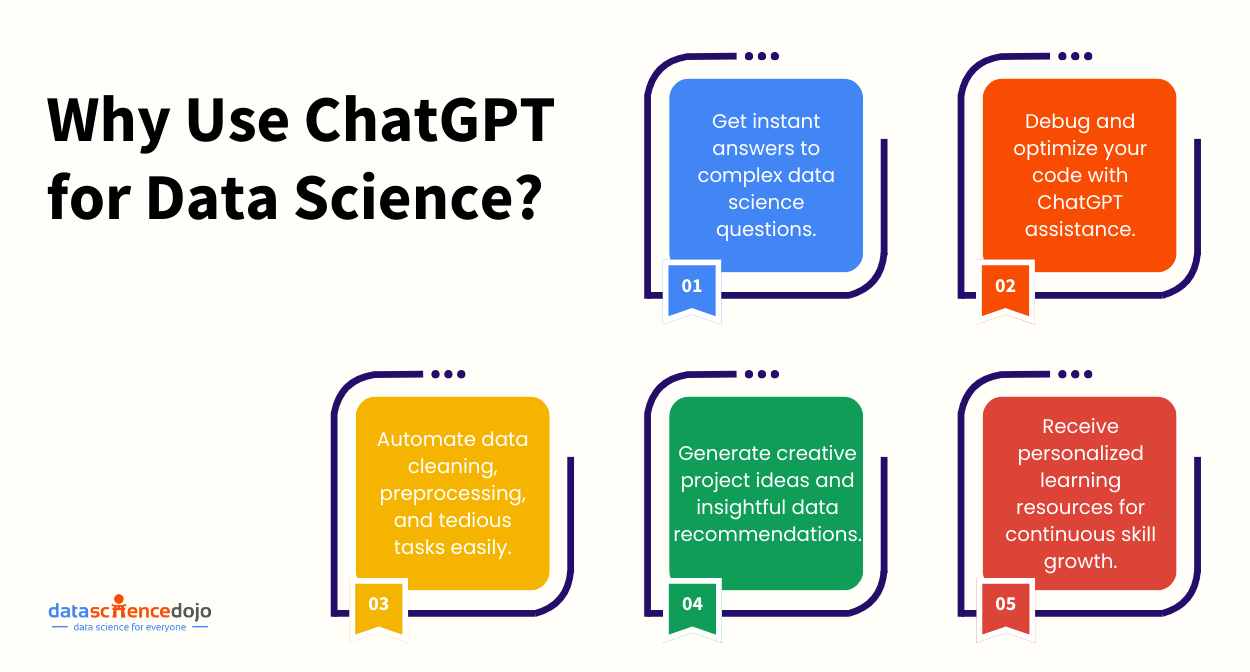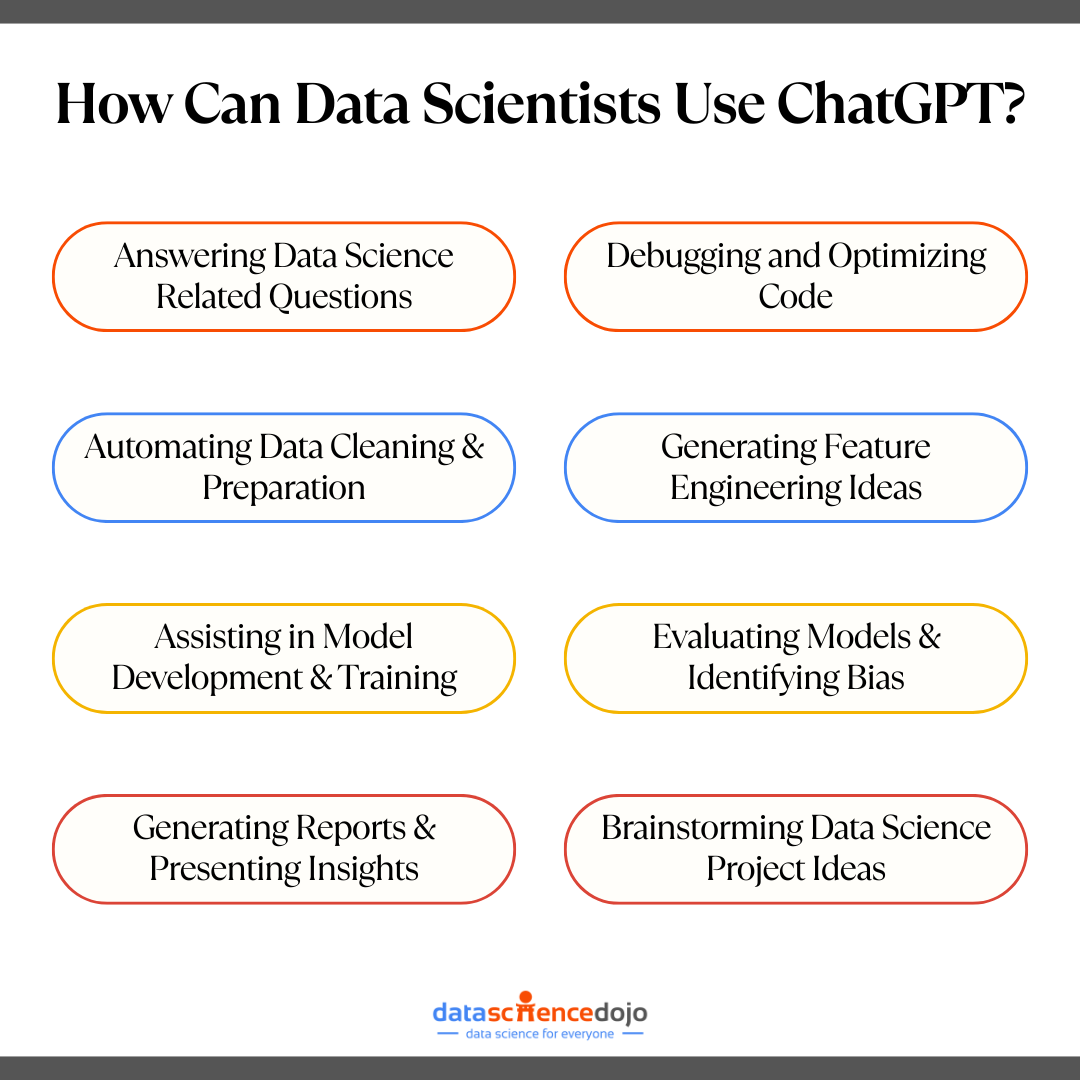If you have ever found yourself staring at a stubborn bug in your code at 2 AM, scouring Stack Overflow for answers, or endlessly tweaking hyperparameters without seeing improvements – you are not alone. Data science is as exciting as it is challenging, and sometimes, even the most experienced professionals need a helping hand.
This is where we can rely on ChatGPT for data science assistance. It can act as your personal AI-powered tool that can simplify complex concepts, debug code, suggest better machine learning models, and even generate project ideas.
With increased reliance on data in the digital market, there is a rising demand for efficient and intelligent data science solutions. The generative AI models help data scientists cope with this rapid advancement by cleaning data, building models, and interpreting results.
But how exactly can you use ChatGPT to level up your data science projects? Let’s dive into the key ways it can supercharge your workflow and enhance your expertise.
Uses of Generative AI for Data Scientists
Advanced AI techniques are useful for data scientists to streamline their workflows, uncover deeper insights, and build more accurate models with less effort. This section explores the key areas where Generative AI is making a significant impact on data scientists.
Test your knowledge of generative AI
Data Cleaning and Preparation
Data cleaning and preprocessing are among the most time-consuming tasks in a data scientist’s workflow. Poor data quality – such as missing values, inconsistencies, and duplicate records – can significantly impact model performance.
Generative AI can automate the process in the following ways:
- Error Detection & Correction: AI models can detect anomalies, such as incorrect email addresses, duplicate customer records, or misclassified data, and automatically correct them.
- Missing Value Imputation: Instead of manually filling in missing data, Generative AI can predict and generate plausible missing values based on existing patterns in the dataset.
- Data Deduplication: AI can recognize and merge duplicate records, ensuring data integrity and consistency.
Example: A data scientist working on a project to predict customer churn could use generative AI to identify and correct errors in customer data, such as misspelled names or incorrect email addresses. This would ensure that the model is trained on accurate data, which would improve its performance.
Learn about streaming LangChain for real-time data processing
Feature Engineering
Feature engineering is a critical step in the data science pipeline, where new variables are derived from raw data to improve model performance. Generative AI can assist by automatically generating meaningful features, uncovering hidden patterns, and enhancing predictive accuracy.
The role of generative AI in feature engineering can be summed up as follows:
- Extracting Complex Relationships: AI models can analyze correlations between existing variables and create new features that improve model learning.
- Generating Synthetic Features: AI can generate entirely new features based on domain knowledge and historical trends, allowing models to capture deeper insights.
- Automating Feature Selection: AI can identify which features contribute the most to a model’s performance, reducing manual effort.
Example: A data scientist working on a project to predict fraud could use generative AI to create a new feature that represents the similarity between a transaction and known fraudulent transactions. This feature could then be used to train a model to predict whether a new transaction is fraudulent.
Read more about feature engineering
Model Development and Training
Building and optimizing machine learning models requires a large amount of labeled data and computational resources. Generative AI can accelerate model development by creating synthetic data for training, optimizing hyperparameters, and even generating new model architectures.
For example, generative AI can be used to generate synthetic data to train models or to develop new model architectures. These roles of AI can be listed as:
- Synthetic Data Generation: When real-world data is scarce, Generative AI can create high-quality synthetic data that mimics real datasets, helping train models more effectively.
- Data Augmentation: AI-generated variations of existing data (e.g., slightly modified images or text samples) can improve model generalization and prevent overfitting.
- AutoML & Hyperparameter Optimization: AI-driven tools can automate the selection of optimal machine learning models and hyperparameters, reducing trial and error.
Example: A data scientist working on a project to develop a new model for image classification could use generative AI to generate synthetic images of different objects. This synthetic data could then be used to train the model, even if there is not a lot of real-world data available.
Model Evaluation and Bias Detection
Model evaluation is crucial for ensuring that ML models generalize well to new data and do not present biases in their responses. Generative AI can be used to create synthetic test data, allowing data scientists to evaluate model performance and identify areas for improvement.
Hence, generative AI can be used to evaluate the performance of models on data that is not used to train the model. This can help them identify and address any overfitting in the model. AI helps in the process by:
- Simulating Edge Cases: AI can generate synthetic test cases that represent rare or unseen scenarios, helping evaluate model robustness.
- Detecting Bias in Models: AI-generated data can be used to test whether a model is biased against certain demographic groups or underrepresented data points.
- Overfitting Prevention: AI can generate realistic but unseen data points to test if a model performs well beyond its training dataset.
Example: A data scientist working on a project to develop a model for predicting customer churn could use generative AI to generate synthetic data of customers who have churned and customers who have not churned. This synthetic data could then be used to evaluate the model’s performance on unseen data.
You can also read about the LLM evaluation
Communication and Explanation
It is a challenge to interpret and communicate model results, especially to non-technical stakeholders. Data scientists can use generative AI to generate human-readable reports, visualizations, and explanations that make complex models more interpretable. Some key roles of AI in this process include:
- Natural Language Summarization: AI can convert complex model outputs into easy-to-understand reports.
- Visual Storytelling: AI-generated infographics and dashboards can help communicate key insights more effectively.
- Explainable AI (XAI): AI can generate textual explanations for why a model made a certain prediction, increasing transparency.
Explore what is explainable AI in detail
Example: A data scientist working on a project to predict customer churn could use generative AI to generate a report that explains the factors that are most likely to lead to customer churn. This report could then be shared with the company’s sales and marketing teams to help them develop strategies to reduce customer churn.
Hence, AI is reshaping the role of data scientists, making them more productive, efficient, and innovative. It automates tedious tasks, enhances data quality, and generates new insights, freeing up data scientists to focus on high-impact decision-making and complex problem-solving.
How to Use ChatGPT for Data Science Projects?
Apart from being a chatbot, ChatGPT is a powerful assistant that can help data scientists in their projects. Whether you’re a beginner looking to learn the fundamentals or an experienced data scientist trying to optimize workflows, ChatGPT can be an invaluable tool.
With its ability to understand and respond to natural language queries, ChatGPT can be used to help you improve your data science skills in a number of ways. Here are just a few examples where you can leverage ChatGPT to improve your data science skills and streamline your projects:
Answering Data Science-Related Questions
Every data scientist, no matter how experienced, encounters challenging concepts and problems. One of the most obvious ways in which ChatGPT can help you improve your data science skills is by answering your data science-related questions.
ChatGPT can help a data scientist by:
- Explaining statistical concepts – Need help understanding p-values, confidence intervals, or hypothesis testing? ChatGPT can break them down in simple terms.
- Guiding coding problems – Struggling with NumPy, Pandas, or TensorFlow? ChatGPT can troubleshoot your code and provide optimized solutions.
- Clarifying ML algorithms – From decision trees to deep learning, ChatGPT can walk you through algorithms step by step.
Learn about the key statistical distributions in ML
As a result, you can save time that would have been spent searching for answers. ChatGPT can also share easy-to-understand explanations, tailored to your understanding of data science. Thus, it can help clarify concepts that might otherwise seem confusing.
Providing Personalized Learning Resources
With the vast amount of data science resources available online, it can be overwhelming to figure out where to start. ChatGPT can act as a personalized learning guide, recommending resources based on your skill level and interests. This ChatGPT-powered assistance would ensure your success by:
- Suggesting beginner-friendly courses – If you’re new to data science, ChatGPT can recommend online courses, YouTube tutorials, and books.
- Pointing to advanced materials – If you want to dive deeper into topics like Bayesian statistics or reinforcement learning, ChatGPT can suggest research papers and specialized courses.
- Providing coding challenges – To sharpen your skills, ChatGPT can generate coding exercises and Kaggle competition recommendations.
While it makes your life easy as you can avoid overwhelming information online, it also ensures that you are directed to relevant and high-quality sources. Thus, ChatGPT can become your learning companion, making sure you learn at the right and suitable pace.
Read more about ChatGPT plugins
Offering Real-Time Feedback
One of the biggest challenges for data scientists, especially beginners, is debugging and improving code. With the use of ChatGPT, this process can become simpler and you will not have to endlessly Google error messages to check your code.
ChatGPT can help you improve your data science skills is by offering real-time feedback on your work. You simply have to ask the chatbot to review your code, identify issues, and suggest improvements. ChatGPT can:
- Debug errors – ChatGPT can analyze error messages and help you fix your code.
- Optimize performance – Suggests better algorithms, efficient data structures, and faster processing methods.
- Explain best practices – Provides guidance on clean code, modularity, and documentation.
Thus, as a data scientist you would escape hours of frustrating work of debugging your code. It will also assist you in writing cleaner and more efficient codes. Thus, encouraging best coding practices, making your work more readable and maintainable.
Generating Data Science Projects and Ideas
Coming up with interesting project ideas can be difficult, especially when you are trying to build a portfolio or work on something unique. ChatGPT can help brainstorm project ideas by analyzing your interests, skill level, and current knowledge. It can suggest topics that will challenge you and help you build new skills.
This can help you as ChatGPT:
- Suggests project ideas – Whether you’re into finance, healthcare, or social media analytics, ChatGPT can generate project ideas.
- Provides datasets – Recommends datasets from Kaggle, UCI, or open-source repositories.
- Helps with project planning – Suggests how to structure a project, from data collection to deployment.
Whether you’re learning new concepts, debugging code, or brainstorming projects, it can help you work more efficiently and improve your skills.
Level Up Your Data Science Game with Generative AI
The role of a data scientist is constantly evolving, and with tools like ChatGPT for data science, you can work smarter, not harder. Whether it is debugging code, generating new project ideas, or automating tedious tasks like data cleaning, generative AI is quickly becoming an essential part of every data scientist’s toolkit.
By embracing AI-powered tools like ChatGPT, you can accelerate your learning, improve your efficiency, and focus on solving complex, high-impact problems. The more you integrate AI into your workflow, the more productive and innovative you become as a data scientist.
But mastering data science is not just about using AI, but about building a strong foundation in machine learning, statistics, and analytics.
If you’re looking to take your skills to the next level, check out the Data Science Bootcamp by Data Science Dojo. Whether you’re just starting out or looking to refine your expertise, this hands-on program will give you the practical knowledge you need to thrive in the field.









